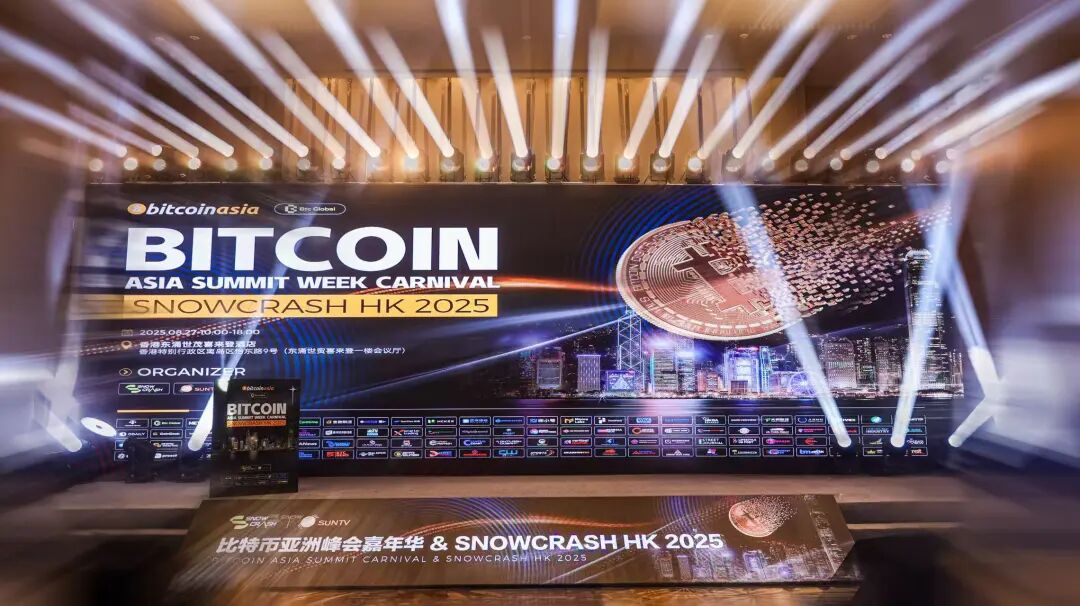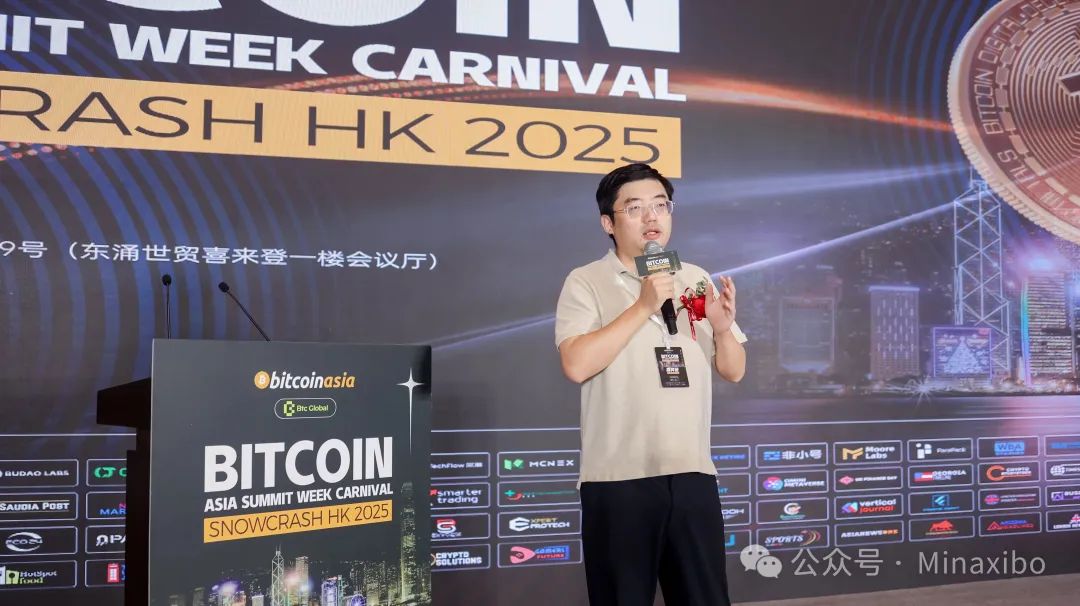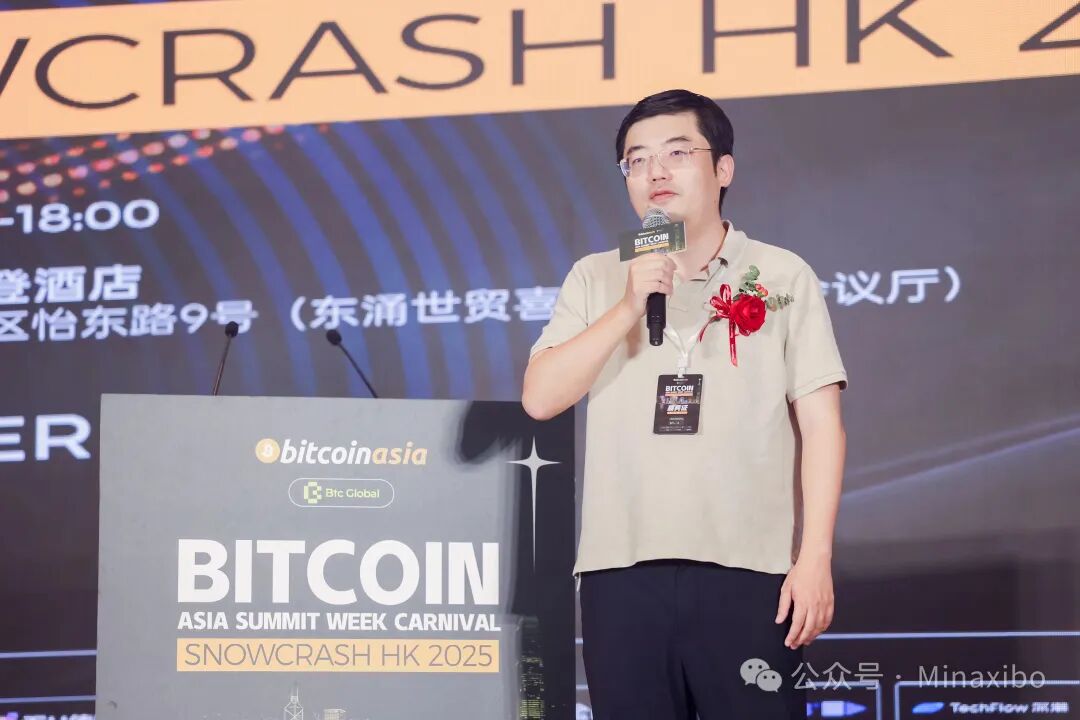Recently, Bitcoin Asia 2025 grandly opened in Hong Kong. Against the backdrop of Bitcoin hitting a new all-time high of USD 112,000, the attention on this event is undoubtedly set to soar. As one of the world’s most active hubs for Bitcoin and digital currency applications, Hong Kong once again highlighted the openness and leadership of its international financial center through this event, fully demonstrating Asia’s leading role in shaping the future of the digital economy.
Today, the digital economy not only continues to improve enterprise efficiency and inject new momentum into the market but also gradually reshapes the traditional logic of asset circulation and value realization. In his keynote speech titled “Micro-Assets: Rethinking RWA – From ‘Bulk Assets’ to ‘Human-Centric Value'”, Mr. Danny Deng, CEO of MINAX Group, took the lead in proposing a development path to restructure Real-World Assets (RWA) with “micro-assets”.
Looking Back on a Decade of Industry Evolution and Raising Questions About Web3 Development
Mr. Danny Deng, CEO of MINAX Group, looked back on his experience entering the cryptocurrency industry in 2013. At that time, the industry was still in its infancy, and there was great anticipation for blockchain technology and its applications. After a decade, the value of cryptocurrencies has soared far beyond expectations, becoming a mainstream global asset.
When talking about the original aspiration of the industry, Mr. Danny Deng stated that he hoped blockchain technology would bring comprehensive social changes. Today, some of these changes have already begun to take shape—for example, El Salvador’s adoption of Bitcoin, the United States’ efforts to build a “cryptocurrency capital”, and Hong Kong’s active exploration of blockchain development paths. However, the current industry is dominated by giants, with constant news of billions of US dollars in assets being onchained and listed. Traditional blockchain practitioners are facing confusion amid this wave. Mr. Deng raised questions: How can small and medium-sized enterprises (SMEs) and the general public embrace Web3? And how can RWA establish a close connection with the public?
Analyzing Existing Dilemmas in RWA and Pointing Out Misunderstandings in Traditional Models
Mr. Danny Deng bluntly pointed out that many current RWA projects have fallen into misunderstandings. Securitizing all assets is not the only path. Moreover, in Hong Kong, the qualification standard for “accredited investors” (requiring liquid assets of over HKD 8 million) easily reduces RWA to an “elite circle game”, making it difficult for assets to achieve true value growth. At the same time, RWA is closely tied to stablecoins—without stablecoins, investing in RWA would involve complex and non-compliant processes, seriously hindering market expansion. Currently, most RWA projects remain at the conceptual stage, and there are few complete successful cases covering registration, ownership confirmation, and trading.
MINAX’s Innovative Initiative: Building a Brand Exchange to Launch the Micro-Asset Era
Based on a profound understanding of industry pain points, Mr. Danny Deng introduced the world’s first brand exchange project that MINAX is advancing. The project aims to transform brands into digital assets through three core measures:
- Using a brand’s intangible assets as collateral for issuance. As a core asset of an enterprise, a brand is crucial to the business—capturing the brand means grasping the lifeline of the enterprise;
- Setting a fixed upper limit for brand assets, analogous to Bitcoin, to avoid complex situations such as stock issuances;
- Linking the value of brand assets to the brand’s own development, and driving asset value growth through measures such as revenue repurchases.
Mr. Danny Deng emphasized that brands are defined as a new asset category because brands are closely related to everyone—daily consumption and life behaviors can be converted into micro-assets. The aggregation of these micro-assets is expected to form personal wealth, truly realizing “lifestyle as investment”. This model can closely connect enterprises, users, and consumers, making RWA no longer out of reach but truly integrated into everyone’s life. The project has received support from many financial experts and Web3 practitioners—for instance, Mr. Gong Fangxiong, Head of Investment Banking at J.P. Morgan China, serves as the Chairman of the exchange. All parties are working together to build a new RWA system.
At the end of his speech, Mr. Danny Deng looked to the future. With the advancement of global compliance, it is expected that in the next 10 to 20 years, industries across the board will undergo large-scale transformation to Web3. Every enterprise may become a Web3 enterprise, owning digital assets, knowledge systems, and communities. MINAX Group is willing to work with all parties in the industry to promote Web3 to benefit more industries and users, and jointly witness the transformation and development of the industry.
【Risk Warning】This article’s content is for informational purposes only and does not constitute any investment advice. Brand asset trading and investment involve high risks and volatility. Users are advised to fully understand the associated risks and make cautious decisions before investing. MINAX is not responsible for any investment losses resulting from reliance on this content. Please invest rationally based on your risk tolerance.



